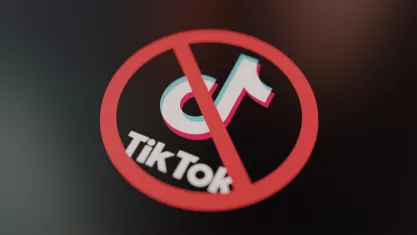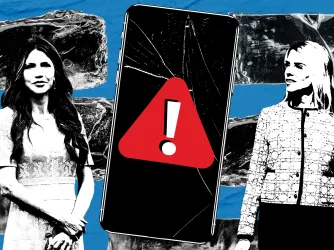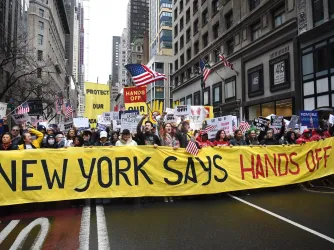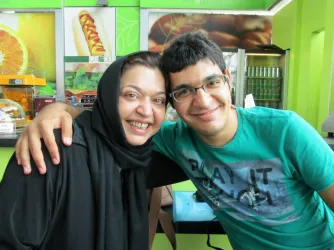Table of Contents
Contra FIRE: Hasen on how the government should identify professional journalists for access and protection – First Amendment News 418

First Amendment News is a weekly blog and newsletter about free expression issues by Ronald K. L. Collins. It is editorially independent from FIRE.
UCLA Law Professor Richard Hasen has a resourceful essay in a forthcoming book on how the government might best identify professional journalists for access to government events, as well as the related protections afforded to journalists. In Part IV of that essay, as highlighted below, Hasen takes issue with certain arguments tendered by FIRE in its amicus brief, which was filed in the Ninth Circuit in TGP Communications v. Sellers (Ronald G. London, counsel of record).
An abstract of the Hasen essay is set out below, followed by a few excerpts from its critique of FIRE’s views. Given that, I have invited the lawyers for FIRE to respond in the next FAN, and they have agreed. Stay tuned for that next week!
- Richard L. Hasen, “From Bloggers in Pajamas to The Gateway Pundit: How Government Entities Do and Should Identify Professional Journalists for Access and Protection,” Ron Nell Anderson Jones and Sonja R. West, eds., “The Future of Press Freedom: Democracy, Law and the News in Changing Times” (Cambridge University Press, 2025).

Abstract
This paper examines how government entities determine who is a journalist to allocate resources under conditions of scarcity and to assure that the press can conduct their functions without undue government regulation and interference. Using a new dataset of 172 laws, rules, and procedures that different government entities have used to define the press, it describes the most common tests government entities use for identifying journalists and compares them to each other. Most of the definitions appear aimed at identifying the class of professionals who regularly gather, report, and disseminate news.
The paper then describes the relatively rare, reported litigation around these journalist-defining rules, teasing out the potential dangers of relying on particular definitions of journalists. Much of the litigation easily distinguishes between professional and non-professional journalists, and a few have dealt with the exclusion of journalists for permissible reasons, such as disruptive behavior. But not every issue is easy.
Using the example of litigation over Maricopa County, Arizona’s decision to exclude a faux journalist for The Gateway Pundit from an area where ballots were being tabulated following the 2022 elections, It focuses particularly on the line between unconstitutional viewpoint discrimination and permissible extension of the press exemption only to those who engage in legitimate professional journalism.
The paper then makes four normative recommendations about the tests government entities should use to define journalists.
- First, government entities should have explicit and meaningful standards for press exceptionalism.
- Second, most press exceptionalism should be limited to professional journalists who regularly produce news stories or commentary.
- Third, press exceptionalism should not turn the type of technology used to communicate.
- Fourth, government entities should continue to have the power to grant press exceptionalism to “bona fide correspondents of repute in their profession” so long as they do not engage in viewpoint discrimination.
Excerpts of Hasen’s critique of FIRE’s amicus brief (footnotes omitted)
[S]ome supporters of The Gateway Pundit argue that it is unconstitutional to award press passes only to journalists who are bona fide professionals of repute. For example, the group FIRE (Foundation for Individual Rights and Expression) filed an amicus brief along with another organization in the TGP Communications case attacking the very idea that government entities permissibly may look at standards such as repute in the profession or commitment to objectivity as a legitimate basis to decide who gets a press pass. FIRE wrote that “terms like ‘repute,’ ‘associations,’ ‘journalistic integrity,’ and ‘credibility’” are vague and standardless. It further argued that it “is highly questionable whether the government even could devise non-viewpoint discriminatory criteria to decide whether a journalist demonstrates “objectivity,” because requiring a journalist to be ‘objective’ inherently requires him to meet the government’s conception of a particular viewpoint (‘objectivity’) and punishes him for reporting from other viewpoints (such as a conservative slant).”
In making its argument, FIRE sought to have the Ninth Circuit reject a contrary holding of the United States Court of Appeals for the Seventh Circuit in the John K. MacIver Institute for Public Policy v. Evers. That case concerned an application by the Wisconsin governor’s office of the same standards later adopted by Maricopa County to exclude someone from a press conference on grounds of not meeting the standards. The Seventh Circuit defended the governor’s standards as reasonable, viewpoint neutral, consistent with public policy in informing the public, and in line with similar standards used by the United States Congress and many others. [Ateba v. Jean-Pierre ((D.D.C. Dec. 7, 2023), appeal filed, No. 24-05004 (D.C. Cir. Jan. 11, 2024)] too is a case where a federal district court appeared to uphold the general permissibility of a “bona fide repute in the profession” standard.
[ . . . ]
We should reject the nihilism of a post-truth world insisting that we cannot distinguish between The New York Times and The Gateway Pundit and that there is no way of measuring objectivity in reporting. In contrast to the arguments of FIRE and others, there are empirically verifiable facts in the world, and entities purporting to be journalists that systematically deny those facts or regularly present empirically false claims as facts should not be considered journalists entitled to press exceptionalism. The best way to enforce such rules is by examining whether the entity claiming press privileges complies with journalistic practices such as fact-checking, giving those written about a chance to respond, and not reporting empirically false facts as proven. These issues can be examined in a systematic way without inviting arbitrary government action.
The key is to avoid slipping into viewpoint discrimination, particularly if the viewpoints expressed by the person seeking press exceptionalism are controversial. Someone who proves employment as a professional journalist should be denied press privileges only if the person seeking press status has no track record of consistently gathering, reporting, and disseminating truthful information, or if the person has a track record of consistently reporting and disseminating empirically verifiable false claims as true. This standard takes away most discretion on the part of government entities, giving them something specific and empirically verifiable to focus on, and such a decision may be meaningfully reviewed by courts. [itals. in original]
Related
- Symposium: “The Future of Press Freedom: Democracy, Law, and the News in Changing Times,” Knight First Amendment Institute (May 3, 2024)
On May 3, 2024, the Knight First Amendment Institute at Columbia University will bring together an interdisciplinary group of scholars for a symposium aimed at identifying and protecting core press functions amid a changing news landscape.
The symposium, “The Future of Press Freedom: Democracy, Law, and the News in Changing Times,” is a collaboration between the Knight Institute and the Institute’s 2023-2024 Senior Visiting Research Scholars RonNell Andersen Jones and Sonja R. West.
It will take place in-person at Columbia University and online. RSVP to learn more.
Co-sponsored by Columbia Law School, Columbia Journalism School, and the Knight First Amendment Institute at Columbia University.
Review denied in license requirement for online talk therapy
The case is Brokamp v. James. The two issues raised in the case were:
- whether a New York law requiring [out-of-state online] speakers to obtain a license before offering talk therapy pertaining to “disabilit[ies], problem[s], or disorder[s] of behavior, character, development, emotion, personality or relationships,” N.Y. Educ. Law § 8402(1), is content-based, and
- whether the government can defeat a First Amendment challenge to a licensing scheme for talk therapists at the motion-to-dismiss stage by relying on legislative history and “reasonable” speculation that contradicts the allegation

Relevant facts from Petitioner’s brief:
Prior to the pandemic, Dr. [Elizabeth] Brokamp provided services in person in Virginia, and she is licensed in that state. During the pandemic, however, Dr. Brokamp moved her counseling practice online, and Dr. Brokamp has continued to provide online counseling as the pandemic has abated. App. 103a. This has made it possible, as a practical matter, for her to continue counseling clients who have relocated to other jurisdictions, including New York. It has also brought her into conflict with the nation’s patchwork of counseling licensing laws, as it simply is not practical for Elizabeth to be licensed in every state where her clients might move.
Dr. Brokamp’s services consist solely of having conversations with her clients, in an effort to improve their emotional well-being. She does not prescribe medicine, conduct medical procedures, or offer any services other than conversation.
[ . . . ]
The [New York] statute requires that anyone who practices “mental health counseling” within the state maintain a license . . . Obtaining a license is not easy. The statute re- quires, among other things: an exam, 3,000 hours of supervised experience, a master’s degree, “good moral character,” and recurring fees.
[ . . . ]
While these burdens may not be insurmountable, they are significant enough that Dr. Brokamp chose to stop counseling clients in New York rather than try to obtain and maintain a New York license. She is not alone. It is relatively rare for therapists to be licensed in multiple states, and one survey found that “70% percent of therapists reported that they had to stop seeing a client who moved to a different state,” which can be “profoundly damaging in a health care category where therapeutic alliance and fit are so critical to outcomes.” With the rise of teletherapy, therapists must “try to keep track of where their clients are living and whether they can legally counsel them,” and “therapists, afraid of breaking the law, have stopped seeing some of their patients.”
[ . . . ]
The district court dismissed the complaint in its entirety under Rule 12 . . . It also dismissed her facial claim, without noting which level of First Amendment scrutiny applied or conducting any tailoring analysis. Dr. Brokamp timely appealed to the Second Circuit, which affirmed on April 27, 2023. The court held that Dr. Brokamp did have standing to challenge the licensing law, both facially and as applied, but it rejected her claim on the merits.
FIRE weighs in on proposed TikTok ban

- “FIRE opposes House bill empowering the president to ban TikTok,” FIRE (April 1)
The Foundation for Individual Rights and Expression opposes H.R. 7521, which would grant the president a dangerous degree of power over speech platforms used by Americans.
H.R. 7521 empowers the president to declare that a website or app presents a national security threat if the platform offers basic communications features and has certain connections to a “foreign adversary country.” Upon this declaration, the platform’s owner must complete a divestiture or a “similar transaction” that the president finds adequate to mitigate the threat. If such a transaction does not occur within six months, the platform is banned from app stores in the United States. The bill specifically requires TikTok to complete this divestment process or be banned.
While FIRE is not in a position to evaluate the potential privacy and cybersecurity concerns presented by TikTok or other foreign-owned platforms, banning TikTok or other platforms used for expressive activity must be a last resort. Tens of millions of Americans use TikTok to share and consume information, news, ideas, political advocacy, and creative content, so all options for a divestiture must be exhausted before the government takes the unprecedented step of banning the platform.
We urge the Senate to reject H.R. 7521, and we suggest its supporters consider whether they want the next president — whoever that might be — to wield such power over Americans’ ability to communicate online.
Kansas paper sues over police raids — seeks over $10 million in damages

“A Kansas Paper and Its Publisher Are Suing Over Police Raids. They Say Damages Exceed $10M,” First Amendment Watch (April 2)
A weekly central Kansas newspaper and its publisher filed a federal lawsuit Monday over police raids last summer of its offices and the publisher’s home, accusing local officials of trying to silence the paper and causing the death of the publisher’s 98-year-old mother.
The lawsuit did not include a specific figure for potential damages. However, in a separate notice to local officials, the paper and its publisher said they believe they are due more than $10 million.
The lawsuit from the Marion County Record’s parent company and Eric Meyer, its editor and publisher, accuses the city of Marion, the Marion County Commission, and five current and former local officials of violating free press rights and the right to be free from unreasonable law enforcement searches guaranteed by the U.S. Constitution. The lawsuit also notified the defendants that Meyer and the newspaper plan to add other claims, including that officials wrongly caused the death of Meyer’s mother the day after the raids, which the lawsuit attributes to a stress-induced heart attack.
Related
- Heather Hollingsworth, “3rd employee of Kan. weekly newspaper sues over police raid that sparked a firestorm,” Free Speech Center (April 1)
Journal of Free Speech Law symposium on lies and the law
- Symposium on Lies and the Law, Journal of Free Speech Law (2024)
Knight Institute Symposium: Lies, Free Speech, and the Law
(articles without links forthcoming within the next two weeks)
- Genevieve Lakier, Lies and the Law: An Introduction
- Alan K. Chen, Investigative Deception Across Social Contexts
- Adam M. Enders & Joseph E. Uscinski, What's the Harm?
- Jamal Greene, Government Counterspeech
- Heidi Kitrosser, Protecting Public Knowledge Producers
- Sam Lebovic, Fake News, Lies, and Other Familiar Problems
- Artur Pericles L. Monteiro, Anonymity, Identity, and Lies
- Helen Norton, Distrust, Negative First Amendment Theory, and the Regulation of Lies
- Deborah Pearlstein, Democracy Harms and the First Amendment
- Mark Tushnet, Epistemic Disagreement, Institutional Analysis, and the First Amendment Status of Lies
- Eugene Volokh, When Are Lies Constitutionally Protected?
- John Fabian Witt, Weaponized from the Beginning
Upcoming symposium on government employee speech

- “Permission to Speak Freely? Managing Government Employee Speech in a Democracy,” Knight First Amendment Institute (April 5, 2024)
On April 5, 2024, the Knight First Amendment Institute at Columbia University will bring together an interdisciplinary group of scholars and experts for a symposium exploring the speech rights of public employees—from the civil service and public sector unions to educators and researchers.
In our deeply polarized political environment, the question of how a democracy ought to manage the speech of some 22 million public employees is more important than ever. We'll examine this issue through a series of conversations about First Amendment, administrative, and labor law; democratic theory and political contestation; and the balance between transparency and autonomy.
The symposium, “Permission to Speak Freely? Managing Government Employee Speech in a Democracy,” is part of a collaboration between the Knight Institute and the Institute’s 2023-2024 Senior Visiting Research Scholar Sam Lebovic.
It will take place in person at Columbia University and online. RSVP to learn more.
Co-sponsored by Columbia Law School and the Knight First Amendment Institute at Columbia University.
Rohde on the ACLU representing the NRA
- Stephen Rohde, “Why Is the ACLU Representing the NRA?” LA Lawyer Magazine (March 2024)

The American Civil Liberties Union is not representing the National Rifle Association in the U.S. Supreme Court because it supports the NRA's mission but because public officials should not be allowed to abuse powers of the office to blacklist an organization just because they oppose its political views, as the ACLU explained in announcing it would represent the NRA in National Rifle Association v. Vullo.
[ . . . ]
To assess the danger . . . pose[d] to freedom of speech, we need to suspend personal views of the NRA or COVID vaccine deniers. What if state officials with strong oppositional views to Planned Parenthood or the Sierra Club used state power to coerce financial institutions to refrain from doing business with those organizations? What if the next presidential administration believed social media platforms were promoting misinformation about slavery and white supremacy in America and coerced those platforms to suppress such information?
Trump (First Amendment) news
- “Judge Expands Trump’s Gag Order After Ex-President’s Social Media Posts About Judge’s Daughter,” First Amendment Watch (April 2)
- “Andy McCarthy: Trump has a First Amendment right to make his defense,” Fox News (April 2)
- Tatyana Tandanpolie, “‘Not quite’: Trump's First Amendment argument in Ga. case ‘unlikely’ to work, experts say,” Salon (March 30)
- Bart Jansen, “Donald Trump's lawyer in Georgia: election lies are protected speech,” USA Today (March 28)
- “Ex-Trump Lawyer Should Lose Law License for Efforts To Overturn Election, Judge Says,” First Amendment Watch (March 28)
More in the news
- “POLL: Americans overwhelmingly oppose efforts to roll back campus due process rights,” FIRE (April 2)
- Katelyn Newberg, “YouTuber, self-proclaimed ‘First Amendment’ auditor gets 6 months behind bars,” Las Vegas Review-Journal (April 1)
- Chris Marr, “States Clash With First Amendment on DEI, Captive Audience Laws,” Bloomberg Law (April 1)
- CJ Staff, “Federal judge allows Charlotte protester’s First Amendment case to proceed,” The Carolina Journal (April 1)
- IFS Staff, “Senior Attorney Brett Nolan Analyzes Gonzalez v. Trevino with the Federalist Society,” Institute for Free Speech (March 29)
- Emma Burrows, “U.S. journalist marks a year in a Russian prison as courts keep extending his time behind bars,” Free Speech Center (March 28)
- Sylvia Hui and Jill Lawless, “U.K. court says Assange can’t be extradited on espionage charges until U.S. rules out death penalty,” Free Speech Center (March 26)
- Greg Gonzales, “New Florida law restricts First Amendment rights online,” FIRE (March 25)
- William Melhado, “How plans for a West Texas drag show turned into a war over the First Amendment,” Texas Tribune (March 22)
2023-2024 SCOTUS term: Free expression and related cases
Cases decided
- McKesson v. Doe (Per Curiam: 7-1 with Thomas, J., dissenting: “[W]e conclude that the Fifth Circuit should not have ventured into so uncertain an area of tort law — one laden with value judgments and fraught with implications for First Amendment rights — without first seeking guidance on potentially controlling Louisiana law from the Louisiana Supreme Court. We express no opinion on the propriety of the Fifth Circuit certifying or resolving on its own any other issues of state law that the parties may raise on remand. We therefore grant the petition for writ of certiorari, vacate the judgment of the United States Court of Appeals for the Fifth Circuit, and remand the case to that court for further proceedings consistent with this opinion.”)
Review granted
- Vidal v. Elster (argued Nov. 1)
- O’Connor-Ratcliff v. Garnier (argued Oct. 31)
- Moody v. NetChoice, LLC and NetChoice, LLC v. Paxton (argued Feb. 26, 2024)
- National Rifle Association of America v. Vullo (argued March 18, 2024)
- Murthy v. Missouri (argued March 18, 2024)
- Speech First, Inc. v. Sands (certiorari granted, judgment re the bias policy claims vacated, and case remanded to the Court of Appeals for the 4th Circuit with instructions to dismiss those claims as moot) (Thomas and Alito, dissenting)
- Gonzalez v. Trevino (argued March 20, 2024)
Pending petitions
- No on E, San Franciscans Opposing the Affordable Care Housing Production Act, et al. v. Chiu
- Mckesson v. Doe
- Pierre v. Attorney Grievance Commission of Maryland
- O’Handley v. Weber
State action
- Lindke v. Freed (Barrett, J., 9-0: “The state-action doctrine requires Lindke to show that Freed (1) had actual authority to speak on behalf of the State on a particular matter, and (2) purported to exercise that authority in the relevant posts. To the extent that this test differs from the one applied by the Sixth Circuit, we vacate its judgment and remand the case for further proceedings consistent with this opinion.”)
- O’Connor-Ratcliff v. Garnier (Per Curiam: 9-0: “We granted certiorari in this case and in Lindke v. Freed (2024), to resolve a Circuit split about how to identify state action in the context of public officials using social media. Because the approach that the Ninth Circuit applied is different from the one we have elaborated in Lindke, we vacate the judgment below and remand the case to the Ninth Circuit for further proceedings consistent with our opinion in that case.”)
Review denied
- Brokamp v. James
- Griffin v. HM Florida-ORL (application for stay denied)
- M. C. v. Indiana Department of Child Services
- Spectrum et al v. Wendler
- Porter v. Martinez
- Molina v. Book
- Porter v. Board of Trustees of North Carolina State University
- NetChoice, LLC v. Moody
- Alaska v. Alaska State Employees Association
- X Corp. v. Garland
- Tingley v. Ferguson (Justice Kavanaugh would grant the petition for a writ of certiorari. Justice Thomas, dissenting from the denial of certiorari. (separate opinion)) ( Justice Alito, dissenting from the denial of certiorari. (separate opinion))
- Jarrett v. Service Employees International Union Local 503, et al
- Sharpe v. Winterville Police Dept.
- Winterville Police Department v. Sharpe
- Stein v. People for the Ethical Treatment of Animals, Inc., et al.
- Blankenship v. NBCUniversal, LLC
- Center for Medical Progress v. National Abortion Federation
- Frese v. Formella
- Mazo v. Way
Free speech related
- Miller v. United States (pending) (statutory interpretation of 18 U.S.C. § 1512(c) advocacy, lobbying and protest in connection with congressional proceedings) // See also Fischer v. United States (to be argued April 16)
Previous regularly scheduled FAN
FAN 417: “She’s back! Strossen’s new and updated edition of ‘Defending Pornography’”
This article is part of First Amendment News, an editorially independent publication edited by Ronald K. L. Collins and hosted by FIRE as part of our mission to educate the public about First Amendment issues. The opinions expressed are those of the article’s author(s) and may not reflect the opinions of FIRE or Mr. Collins.
Recent Articles
Get the latest free speech news and analysis from FIRE.

FIRE sues Bondi, Noem for censoring Facebook group and app reporting ICE activity

Deep dive into New York’s proposals to ban demonstrations near houses of worship

Iran replaced my mother’s voice with silence


